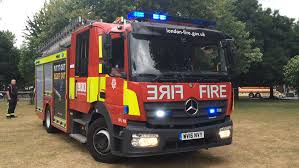By James Simons-
The London fire brigade’s readiness for the Greenfell Tower fire was “gravely inadequate” and fewer people would have died if it had been better prepared, a public inquiry report into the disaster that killed 72 people has concluded.
The report into the worst Uk public tragedy in London since the second world war also concluded that the building had been refurbished in breach of safety regulations . Bick Moore said many lives could have been saved had officers quicker identified that the fire was out of control and told residents to evacuate.
Family members were given an advance copy of the report, and required to sign a non-disclosure agreement before being granted possession of the embargoed document.
In a crucial report, Bick Moore said the London Fire Brigade failed to train its incident commanders and firefighters in how to recognise the need for evacuation or in the dangers of combustible cladding.
The report contradicted the evidence so far that blames the cause of the fire on the cladding panel manufacturer, Arconic, “the principal reason why the flames spread so rapidly up the building” was its aluminium composite panels and the “melting and dripping of burning polyethylene”.
The retired high court judge Sir Martin Moore-Bick, who led the inquiry, found that despite senior officers knowing about the risk of cladding fires from high rise blazes abroad, the “preparation and planning for a fire such as Grenfell” by the London Fire Brigade (LFB) fell far short of what should have been expected.
In the extensive report, Moore-Bick criticised the LFB’s commissioner Dany Cotton for “remarkable insensitivity” for claiming in evidence to the inquiry that she wouldn’t change anything the brigade did on the night. He said the insensitivity showed “the LFB is an institution at risk of not learning the lessons of the Grenfell Tower fire”.
Bick Moore said many lives could have been saved had officers quicker identified that the fire was out of control and told residents to evacuate. the LFB failed to train its incident commanders and firefighters in how to recognise the need for evacuation or in the dangers of combustible cladding.
Advanced copies of the report were given to bereaved family members of the dead, after being made to sign none disclosure agreements.
COMPELLING
Moore-Bick said there was already “compelling evidence that the external walls of the building failed to comply with requirements” of building regulations governing fire safety. They didn’t adequately resist the spread of fire, “on the contrary they actively promoted it” he said.
Lawyers for the LFB sought the ruling that the building breached regulations, arguing the £10m refit completed in 2016 was “catastrophically non-compliant with fire safety requirements”.
The LFB has said the strategy for Grenfell Tower required the compartmentalisation of any fire, It added that it could not have been expected to cope if the building was changed to allow fire to spread the way it did.
Moore-Bick praised the “extraordinary courage and selfless devotion to duty” of rank-and-file officers and said “those in the control room and those deployed on the incident ground responded with great courage and dedication in the most harrowing of circumstances”.
However, the absence of an operational evacuation plan for Grenfell Tower was “a major omission” by the LFB, which was guilty of an “institutional failure” to inform firefighters about the risks of cladding fires before the disaster.
On the night of the fire there was a “failure of command” which meant firefighters with extended-duration breathing kits were deployed too slowly.
Michael Dowden, the watch manager from North Kensington fire station and the commander on the scene for most of the first hour, was criticised for failing to consider an evacuation sooner and not making efforts to find out what residents were telling 999 operators or the conditions in the building.
The inquiry heard an officer of his rank would not normally be in charge of such a huge fire, but Moore-Bick concluded: “I have little doubt that fewer people would have died if the order to evacuate had been given by 2am.”
The report was informed by evidence from hundreds of witnesses including 88 firefighters, control room officers and senior LFB commanders, together with 35 of the bereaved, survivors and residents.

